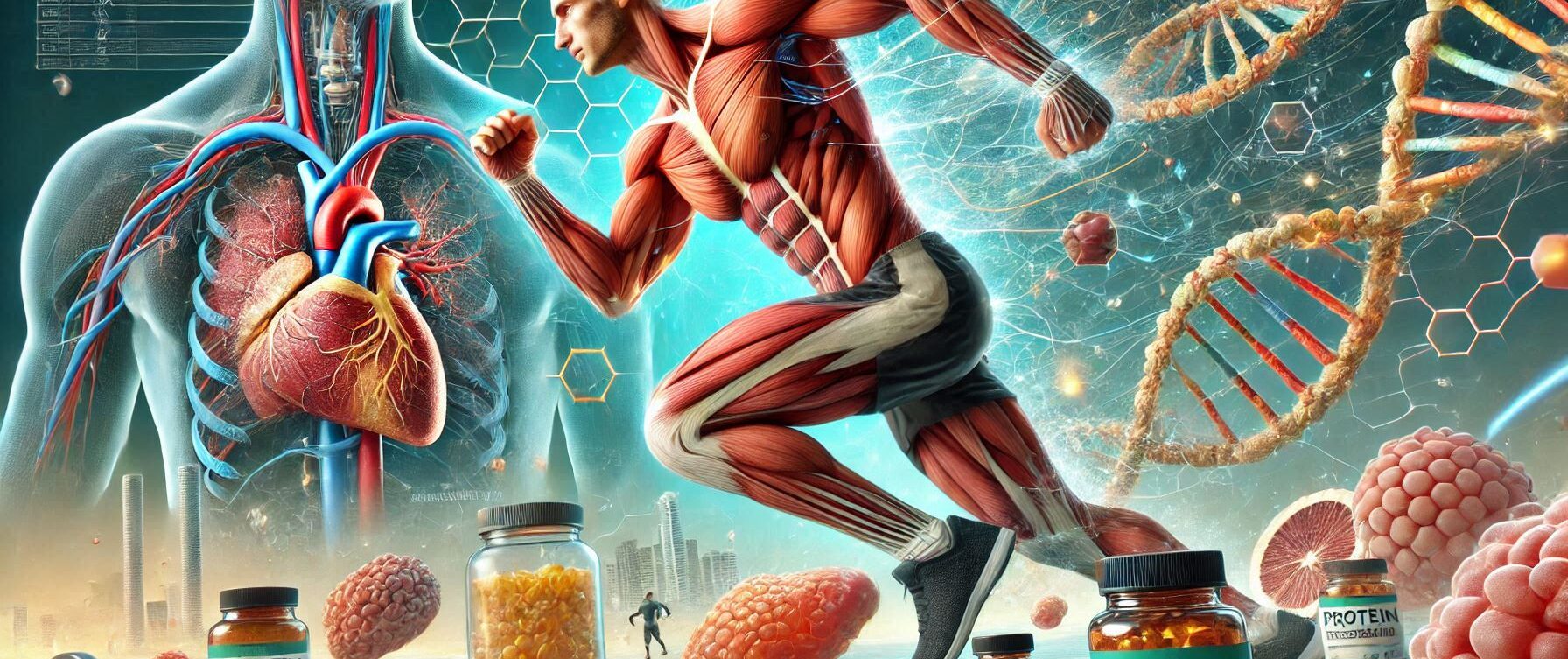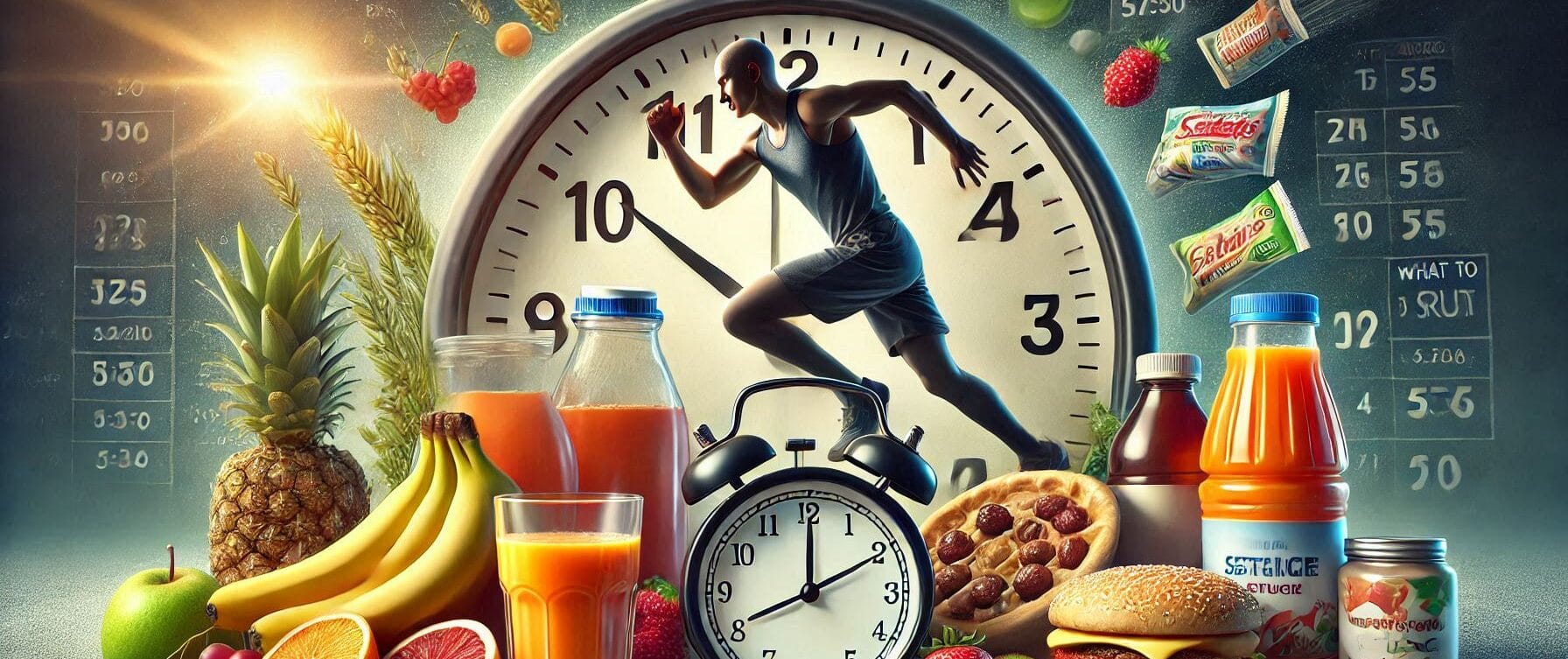Top Takeaways and Key Concepts
Balance macronutrients: Include carbs for energy, protein for muscle recovery, and healthy fats for sustained energy.
Choose quality carbs: Opt for complex carbs like whole grains, fruits, and vegetables for steady energy release.
Power up with protein: Post-run protein helps rebuild muscles; Greek yogurt with fruit makes a tasty choice.
Stay hydrated: Hydration is crucial; carry water during long runs and avoid dehydration-related fatigue.
Timing matters: Eat a carb-rich meal 3 hours before a run and snack on a banana 30 minutes prior for optimal energy.
Summary of This Article
The article focuses on balancing nutrition for improved running performance. It explains the importance of macronutrients, emphasizing carbs, protein, and healthy fats. For optimal energy, choose complex carbs and ensure proper hydration to avoid fatigue. Protein, particularly post-run, helps rebuild muscles. Timing meals is also essential, with advice to eat carbs 3 hours before a run and snack on light options like bananas before running. The article encourages runners to experiment with food choices to find what works best for their bodies and performance.

Running is one of those activities that makes you feel like a superhero—until you realize your body needs more than just willpower and a pair of good shoes to perform at its best. If you're anything like me, you've probably experienced the joy of running while simultaneously contemplating what to eat afterward. Spoiler alert: it’s not just pizza and ice cream (although wouldn’t that be fantastic?). Balancing your diet for better running performance is key, and it can be as tricky as trying to untangle earphones after they've been in your pocket.
Please Note: This post may contain affiliate links. If you click one of them, we may receive a commission at no extra cost to you. As an Amazon Associate, I earn from qualifying purchases.
Understanding Macronutrients to Balance Diet

Let’s start with macronutrients—the building blocks of our diets. You’ve got carbohydrates, proteins, and fats, which sounds suspiciously like a bad sitcom trio. Carbs are your quick energy source; they’re the rocket fuel that gets you out the door and down the road. I remember my first long run when I thought I could skip breakfast because who really needs food? Let me tell you, by mile three I was questioning all my life choices while desperately eyeing every passerby’s snack.
Proteins are like the construction workers of your body; they help repair muscles after those grueling runs. Think about it: each time we pound the pavement, we're essentially hammering nails into our bodies (metaphorically speaking). Afterward, we need protein to fix those metaphorical holes! And then there are fats—yes, fats! They get a bad rap sometimes but trust me; healthy fats from sources like avocados or nuts can provide sustained energy without leaving you feeling sluggish.
Finding Your Carb Sweet Spot for Running Performance

Carbohydrates often seem to hog the spotlight when discussing running nutrition. But here's the kicker: not all carbs are created equal! Some folks might think eating an entire box of donuts counts as carb-loading before a race (I mean, who hasn’t had that thought?), but let’s be real here—it’s more likely to lead to regrettable decisions later on!
Instead, focus on whole grains, fruits, and vegetables for those complex carbs that release energy slowly over time. Before my last marathon attempt—which was fueled by an embarrassing amount of pasta—I made sure to load up on brown rice and sweet potatoes instead. Not only did I avoid feeling like a balloon ready to pop during the race, but I also felt fueled rather than frazzled!
Protein Power-Up – Balanced Diet for Runners

Now let’s talk about protein because if there was ever a nutrient deserving of its own fan club, this would be it! Protein helps rebuild muscles after you've put them through their paces on long runs or intense workouts. While some people might turn their noses up at chicken breasts or tofu (and yes—I’ve had friends declare tofu “the enemy”), finding enjoyable sources is crucial.
I discovered that Greek yogurt is basically dessert masquerading as health food after realizing how much protein it packs in without tasting too bad either! Toss in some fruit or granola post-run for an extra boost—and suddenly you're treating yourself while actually doing something good for your body! Who knew being healthy could taste so delicious?
Hydration for Running Performance and Balanced Diet

You’d think staying hydrated would be easy—just drink water whenever you're thirsty—but alas! It’s rarely that simple when you’re sweating buckets during hot weather runs. Hydration goes hand-in-hand with nutrition; if you’re under-hydrated no amount of kale smoothies will save you from hitting ‘the wall’ mid-run.
During one particularly sweaty summer jog where humidity levels rivaled tropical rainforests (seriously), I learned firsthand how critical hydration truly is. Carrying water bottles or using hydration packs became non-negotiable essentials on longer routes because nothing screams “bad runner” quite like collapsing due to dehydration halfway through an eight-mile loop!
Timing Is Everything for a Running Diet

When balancing your diet for optimal performance timing becomes essential too! Eating right before heading out might sound appealing until your stomach starts doing somersaults halfway through mile two—you know what I'm talking about! Ideally aim for meals rich in carbs around three hours prior so they have time to digest properly.
As far as snacks go. A banana 30 minutes before running can provide just enough fuel without weighing down your stomach like bricks tied together with string—a common mistake many make thinking “more food equals more power!” In reality though? Less can definitely be more when it comes down to getting those miles in comfortably!
Experimentation Is Key
Every runner's body reacts differently based on individual preferences and tolerances—what works wonders for one may leave another clutching their stomach wishing they'd chosen differently instead! Therefore, experimentation plays an important role in discovering what foods keep us energized while avoiding any potential disasters along our journeys.
Over time I've developed favorites ranging from oatmeal topped with berries post-run or even peanut butter toast pre-workout—all thanks largely due diligence spent testing various options until hitting upon combinations yielding maximum results sans gastrointestinal drama!
In conclusion balancing one's diet isn’t rocket science but certainly requires attention alongside consistent effort towards understanding nutritional needs unique per individual runner's journey ahead on roads less traveled—or at least less crowded since they’re usually filled with fellow joggers sharing similar goals amidst laughter echoing throughout parks everywhere!
Suggested Resources:
The Ultimate Guide to Running Nutrition
https://www.runnersworld.com/nutrition-weight-loss/a20805767/the-ultimate-guide-to-running-nutrition/
Nutrition Tips for Runners
https://www.healthline.com/nutrition/nutrition-tips-for-runners
The Importance of Hydration for Runners
https://www.active.com/running/articles/the-importance-of-hydration-for-runners
Frequently Asked Questions
Why are macronutrients important for runners?
Macronutrients provide energy, support muscle repair, and help maintain endurance. Balancing carbs, protein, and healthy fats improves overall running performance.
What types of carbohydrates are best before running?
Complex carbs like whole grains, fruits, and vegetables offer steady energy release and help prevent mid-run fatigue.
How much protein should I eat after a run?
A moderate amount of protein, such as Greek yogurt, lean meat, or tofu, helps rebuild muscles and supports recovery after running.
How can hydration improve running performance?
Proper hydration prevents fatigue, supports endurance, and helps regulate body temperature, especially during long or hot runs.
When should I eat before going for a run?
A carb-rich meal about three hours before running and a light snack like a banana 30 minutes beforehand can optimize energy levels.
Should runners include healthy fats in their diet?
Yes, healthy fats from foods like nuts and avocados provide long-lasting energy and support overall nutrition for endurance.
How do I determine the best diet for my body?
Experiment with different foods and meal timings to see what boosts your energy, digestion, and comfort during runs.

Kevin Collier is a passionate fitness enthusiast dedicated to promoting healthy living through jogging and running. With years of experience in exercise science and a keen interest in weight loss strategies, Kevin shares valuable insights and tips to help individuals achieve their fitness goals. His content on WebJog.com aims to inspire readers to embrace an active lifestyle, emphasizing the benefits of consistent exercise for both physical and mental well-being. Whether you’re a seasoned runner or just starting your fitness journey, Kevin’s expertise and encouragement will motivate you to stay active and live your healthiest life.




